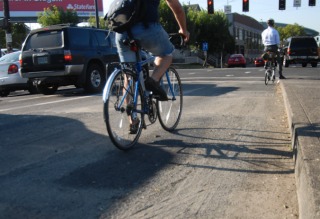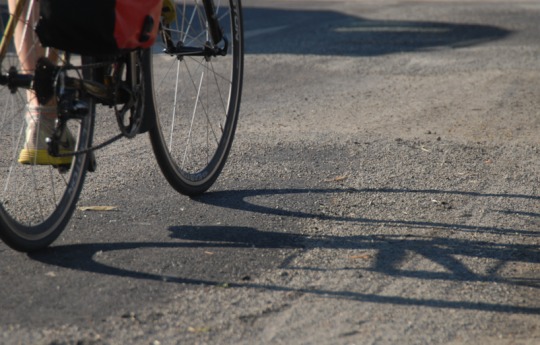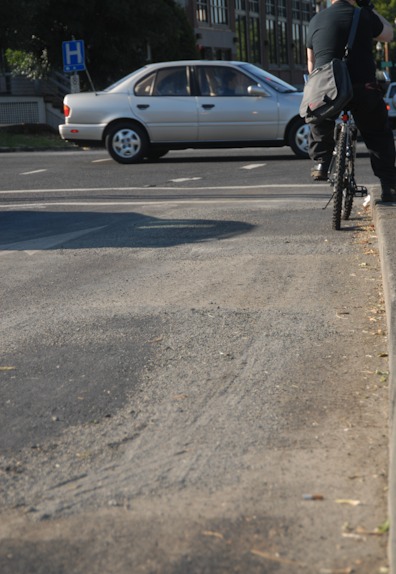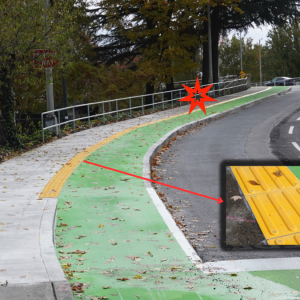
(Photos © J. Maus/BikePortland)
It took just four days after a man was seriously injured from a fall for the Portland Bureau of Transportation (PBOT) to smooth out some nasty lumps in the road on N. Vancouver Ave.
According to tips from readers, crews were out at the scene last night. This morning I stopped by and found the section of road just before N. Broadway as smooth as can be. (Unfortunately, they left a bunch of sand behind.) Below is another image I took this morning and a before/after shot:

Before:
After:

Last Thursday, Michael Weaver hit the bumps as he approached the Broadway intersection and lost control of his bike. He spent three days in the hospital. Yesterday he shared with us that, “I am a mess and in some pain, but I have every expectation of a speedy recovery.”
This morning, PBOT spokesperson Cheryl Kuck left a comment on our initial story saying that,
“PBOT is very sorry to hear about the serious fall and injury on North Vancouver. We wish the rider a full and swift recovery. Our work is focused on improving the safety of the traveling environment for everyone.
The pavement condition recently repaired on North Vancouver is called a stress bump. Extreme heat and heavy vehicle loads, such as the frequent bus service on North Vancouver, can soften asphalt and create bulges in pavement. Crews then have to cut and patch the area. Here’s a link to a story from 2009 about a similar problem on North Mississippi that includes an explanation from a former Maintenance Operations manager.
While PBOT does run a proactive pothole repair operation year-round, a stress bump at any particular location is not predictable, so we appreciate the public’s help in identifying these pavement problems. Our crews will respond as quickly as possible.
In general, the best number to call to report safety hazards or obstructions in the street and in bike lanes is our Dispatch line at 503-823-1700. Operators are on duty 24/7. The public can also report potholes to the hotline at 503-823-BUMP (2867) or use the City’s PDX Reporter mobile app.”
It’s great to see such swift action; but it would be even better if PBOT was more proactive in clearing these types of hazards — especially when they are present on very busy bikeways.








Thanks for reading.
BikePortland has served this community with independent community journalism since 2005. We rely on subscriptions from readers like you to survive. Your financial support is vital in keeping this valuable resource alive and well.
Please subscribe today to strengthen and expand our work.
I’m a bit mystified as to why they left the gravel.
In a braking zone, noless.
Typically, a street sweeper follows an asphalt grinder. Maybe there were some scheduling issues and they figured if the asphalt grinder was available to get it taken care of.
It’s not ground asphalt, it’s fine gravel sprinkled over the new drying/curing asphalt.
Yes they’re sealing the edges of the new asphalt and using the sand to cover up the sticky.
But for the moment they’ve fixed one road hazard and replaced it with another. Buses should sweep most if it aside by the end of the day, though.
Can you people seriously not ride through a bit of sand? This is much better than it was. Bike lanes can’t always be perfect. Learn to adapt a bit instead of complaining constantly.
You mean like this?
http://youtu.be/cCZmuXCkXig
It sucks that someone had to be hurt so badly by these bumps, but I am happy that PBOT responded quickly to remove the hazard.
It’s great that this was fixed. It would be helpful to know something of the labor and cost involved in making the repair. Labor and costs to make pavement repairs are relevant to the city’s ability to take care of pavement problems on a more timely schedule than occurred here.
OK, I’ve seen this everywhere that PBOT does small-scale work over the asphalt.
Jonathan, I think this is worth a little inquiry.
They leave a covering of fine gravel, and they never ever come back to clean it up. It seems procedural/necessary perhaps to prevent passing wheels from scarring or otherwise messing up asphalt that needs more time to cool or cure, but it’s highly hazardous. There’s no signage or barricades to to warn or divert bicycle/motorcycle traffic.
I especially see this with every curb modification in my neighborhood–there have been a half-dozen or more in the past six months, and in every spot the gravel is still there today.
It’s unfortunate that these seem to be at transition zones, where a rider would be braking or turning.
I believe these bumps are caused by buses pulling over and slowing down to load passengers. They are prevalent throughout the city. I have noticed many bus stops now with very large concrete pads for the buses and those eliminate the bumps. Asphalt is fluid and flows according to how the buses “push” it. Concrete won’t do this. Concrete, however, will crack over time. I’ll take the concrete.
Never gotten your 23cm wheel into the seam of a concrete break, eh?
That’ll put you on your face much faster than one of these lumps if you’re not paying attention.
Correct. Pay attention.
Indeed. Also, people should expect and prepare for an imperfect world. The world is not perfect and never will be. Exercise diligence and care and expect mishaps to occur nonetheless. People will crash from time to time. Injuries will occur. Just accept that some level of them will always occur, no matter what. All must heed this advice to avoid undue disappointment from unrealistic expectations.
Or pay in some other precious currency…like skin and blood.
The edges of the repair have liquid tar sealer applied. The sand is applied to the tar to provide traction over this slippery surface. I read more complaints than kudos for the quick response and good work PBOT has done, and suspect that if the bump were replaces with sustainably harvested tropical hardwood boardwalks, inlaid with mother of pearl this crowd would complain about that as well.
Riders might be able to negotiate the hazard of sand in the roadway by paying attention to what they are doing.
Granpa, one story here is the quick response and repair by PBOT following an injury crash. Awesome.
Another story is the hazard they leave behind on a routine basis. Your sarcasm and condescension aside, the hazard still exists and merits some focused attention.
Hardwood and mother of pearl are both slippery when wet so those are terrible choices for resufacing roads.
From a road engineering standpoint roads are self cleaning.
In school they are taught that as long as the profile is slanted down from the center to the edges road debris will be removed by tire scrub action.
I would have to guess that DOT engineers have no official training on how their techniques are dangerous to cyclists.
I’d also surmise that the 3rd party contractors that actually show up to do this sort of work are basing their “best practices” guidelines on contracts and rules setup before anyone considered bicycles as a valid road user.
Would like to see a regular method of repainting our lines yearly than having to call in and remind various DOT’s and metro agencies yearly.
I called about a stretch of Barbur near Terwilliger curves in January, they fixed it, and it’s already barely visible again, almost certainly due to studded tires. This is in a very iffy area where cars drive by at 45-50 mph and turn right frequently into bike lane.
http://goo.gl/maps/Zz1tt
Add turtles every 30 feet to the painted line.
Must have been cheaper to repair than pay out future claims.
nobody will pay you to collide with a non-moving visible object…
That’s not true at all — payouts for potholes, storm grates and bicycle tires, unpainted or unmarked road hazards and construction debris.
Thank you PBOT for the quick repair. I also did not know about the app. Downloading it and will give it a try the next time I spot something.
awesome they acted so fast 🙂
I for one applaud PBOT for fixing a problem quickly when it came to their attention. A little sand/gravel left in the road, construction is a dirty business. Given the paltry level of funding we as a society allocate for transportation, this may be better than we deserve.
We deserve no less than standard of road demanded by the motoring majority.
Because they are PUBLIC roads.
Because we all pay seemingly immeasurably through the Byzantine tax and fee beast that has come to feed our nation’s road system.
Because we, the Public, all deserve to use the road safely and efficiently.
While I prefer a thorough job in which a street is cleared of debris after the debris is allowed to carry out it’s function, I can’t currently complain about this specific case. Maintaining a straight course and not using only your rear brake at high speeds through the sand seems sufficient to prevent danger. How many cyclists complain that the world doesn’t do enough to keep gravel roads clean?
it would be even better if TriMet would report these since they’re mostly at their bus stops…
For bus stops in particular they need to use thick concrete: the buses are heavy, stopping adds to force stresses and normal diesel oil leaks contribute to vastly accelerated surface breakdown.
A thick concrete pad can better withstand the forces of a bus while being immune to the asphalt dissolving powers of hot oil and diesel.
Also we could dye it GREEN to denote the requirement for buses to YIELD to cyclists.
Time for some civil duty, my friends.
Step One: We have been told that we (you know, the people who travel these roads and can best see the pavement as we don’t have car floors blocking the view) can call (503) 823-1700 to let PBOT know exactly where the trouble spots are. If someone (I’m looking at YOU!) had done this, the fall could have been prevented. I’m certain that we have all seen these pressure bumps on the road. I’m calling to let PBOT know where I’ve seen them. If they know about them, they can fix them before more people get hurt.
Step Two: If you see gravel/sand that has persisted beyond the time necessary to cover a repair (or that is left over after winter sanding operations, for that matter), feel free to bring a broom and shovel (Hmm, a job for a cargo bike!) and sweep it up. I’ve swept the curb line along my property to keep it clear, and if I saw a patch of sand/gravel on my commute, I’d get my brain working to fix it (it may be my brain that doesn’t hit the ground from slipping). Yes, really big areas might require more people, but Portland residents are FANTASTIC at coming together to fix problems.
Hear hear. Lots of whining here.
Step 1) Pay attention to where you are riding. Anyone who has rode down Vancouver knows the bumps are there. This was the riders fault.
Thank you PBOT.
Mother of pearl would be kind of awesome for the next time though.
🙂
“…it would be even better if PBOT was more proactive in clearing these types of hazards — especially when they are present on very busy bikeways.”
It would be EVEN better if people riding bikes were more proactive in identifying these types of hazards to authorities — especially when they are on very busy bikeways.
It is a lot cheaper, and a more effective use of tax dollars, to have us, the users, tell PBOT where the problems are, than to have them try and drive around and find what could cause problems.
It would also be useful if the bureaucratic infrastructure wasn’t so dismissive of “petty” bicycle related concerns.
Sorry, hit post before saying this… Thanks PBOT for getting this smoothed out for us.
I noticed that they smoothed a similar section of the road over by the bus stop at NE Broadway and 11th Ave this week. It was getting a buildup of irregular asphalt there too from the bus sitting there for periods.
The buildup at the bus stops and bus-centric lanes reminds me of lava flow..
Thanks for fixing the road! Seems like the bike community is almost as opinionated the equestrian community….but then again, we can call the Romney’s to fix bad trails…:)
This same problem exists in between the portland building and city hall heading towards the Hawthorne bridge on an arguably heavier bike traffic route. I think its at 4th and washington.
I’m always encouraging folks to call 823-SAFE or email safe@portlandoregon.gov with these problems.
But, given that many of the major bikeways in this city have serious pavement deficiencies, perhaps we should also request that PBOT regularly monitor the busiest bikeways themselves.
While citizen complaints is a nice way to help out the Bureau, the best way to serve the public is to actually fix the problems before someone ends up in the hospital.
Ted Buehler
Every level of Gov’t that is responsible for roads has a contact number for letting them know about road defects from individual cities through to state DOT. Find your local and keep them informed about problems.
Nice, quick work, PBOT! Thanks.